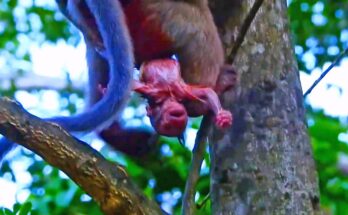Search
Study
In a touching and emotional scene from the wild, a tiny baby monkey captures hearts as it experiences what seems like rejection from its mother. The moment unfolds in a quiet corner of the forest, where the young monkey, still clinging to its soft, downy fur, reaches out for comfort and nourishment. With innocent eyes full of longing, the baby tries to nurse, seeking warmth and security from its mother — but she turns away, appearing distant and uninterested.
The scene is heart-wrenching. The little one, visibly confused, keeps trying to approach her, gently tugging at her fur and crying softly in hopes of being noticed. Yet the mother, perhaps tired, stressed, or asserting a form of natural discipline, moves aside and refuses to offer milk. The baby sits alone for a moment, its tiny face reflecting sadness and uncertainty — a powerful reminder that emotions, love, and even rejection are not unique to humans but deeply present in the animal world.
Animal experts suggest that such behavior can occur for many reasons. Sometimes, a mother monkey might refuse milk if her baby is old enough to start weaning or if she senses illness or weakness. In other cases, environmental stress, lack of food, or social dynamics within the troop can affect maternal behavior. While it appears cruel to our eyes, this might be part of nature’s way of encouraging independence or ensuring survival under difficult conditions.
Still, watching the small monkey’s struggle is deeply moving. The mother eventually glances back, showing a flicker of concern — a look that reveals the complex emotions primates share with humans. Moments like these remind us that animal families, too, face challenges, conflicts, and emotional bonds that mirror our own.


